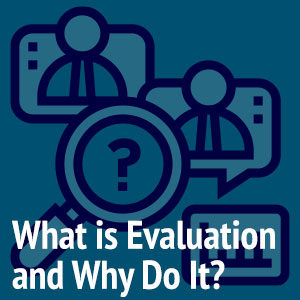 Formative evaluations are evaluations whose primary purpose is to gather information that can be used to improve or strengthen the implementation of a program or initiative. Formative evaluations typically are conducted in the early-to-mid period of a program’s implementation. Formative evaluations can be contrasted with summative evaluation which are conducted near, or at the end of, a program or program cycle, and are intended to show whether or not the program has achieved its intended outcomes (i.e., intended effects on individuals, organizations, or communities). Summative evaluations are used to indicate the ultimate value, merit, and worth of the program. Their findings can be used to determine whether the program should be continued, replicated, or curtailed.
Formative evaluations are evaluations whose primary purpose is to gather information that can be used to improve or strengthen the implementation of a program or initiative. Formative evaluations typically are conducted in the early-to-mid period of a program’s implementation. Formative evaluations can be contrasted with summative evaluation which are conducted near, or at the end of, a program or program cycle, and are intended to show whether or not the program has achieved its intended outcomes (i.e., intended effects on individuals, organizations, or communities). Summative evaluations are used to indicate the ultimate value, merit, and worth of the program. Their findings can be used to determine whether the program should be continued, replicated, or curtailed.
The goal of formative evaluations is to gather information that can help program designers, managers, and implementers address challenges to the program’s effectiveness. In its paper “Different Types of Evaluation” the CDC notes that formative evaluations are implemented “During the development of a new program (or) when an existing program is being modified or is being used in a new setting or with a new population.” Formative evaluation allows for modifications to be made to the plan before full implementation begins, and helps to maximize the likelihood that the program will succeed.” “Formative evaluations stress engagement with stakeholders when the intervention is being developed and as it is being implemented, to identify when it is not being delivered as planned or not having the intended effects, and to modify the intervention accordingly.” See “Formative Evaluation: Fostering Real-Time Adaptations and Refinements to Improve the Effectiveness of Patient-Centered Medical Home Interventions”.
While there are many potential formative evaluation questions, the core of these consists of gathering information that answers:
- Which features of a program or initiative are working and which aren’t working so well?
- Are there identifiable obstacles, or design features, that “get in the way” of the program working well?
- Which components of the program do program participants say could be strengthened?
- Which elements of the program do participants find most beneficial, and which least beneficial?Typically, formative evaluations are used to provide feedback in a timely way, so that the functioning of the program can be modified or adjusted, and the goals of the program better achieved.Brad Rose Consulting has conducted dozens of formative evaluation, each of which has helped program managers to understand ways that their program or initiative can be refined, and program participants better served.




